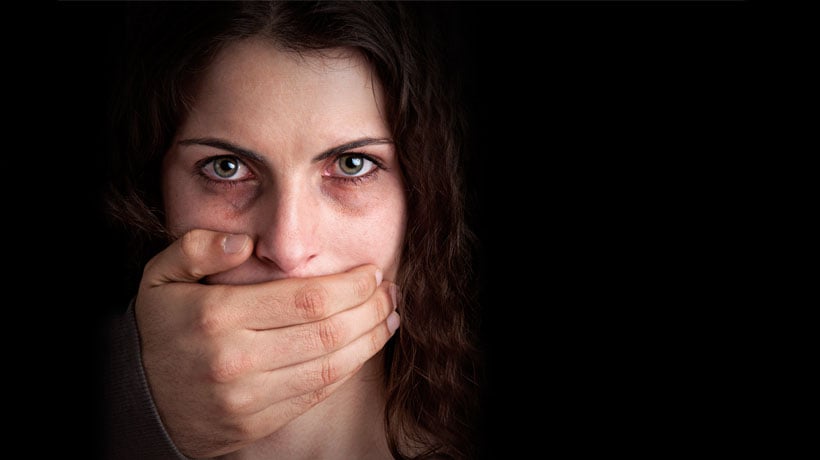No matter how much we want any relationship to work, there is no reason to endure a relationship that subjects you to abuse. This includes any type of abuse, whether it be domestic, verbal, financial, or a combination of the three.
Sometimes it can be hard to identify what kind of abuse you are facing, let alone identify that you are experiencing abuse with so many definitions of what abuse should look like. What all types of abuse have in common is that they make the person on the receiving end feel unsafe and extremely uncomfortable, and the abusive partner acts in a variety of ways to have more power and control over their partners.
If there’s something that makes you suspect it could be the beginning of this behavior, read these 10 red flags that signal abuse and how to shut them down.
Your partner embarrases you or puts you down
One major red flag in a relationship that is verbally abusive is that your partner starts to put you down or embarrass you. This is one way for them to feel that they have power over you. In order to stop this dynamic before it settles, take charge of the situation by voicing your discontent with this treatment as soon as it happens.
Your partner tries to isolate you from your friends/family
Another way that an abusive friend or partner may try to assert dominion over you is by isolating you from your close friends and family. This keeps you away from your support network, so you are more likely to bend to your partner’s desires. To stop this behavior, communicate with your friends and family whenever you feel uncomfortable with your relationship. Additionally, express your concern of feeling disconnected from other people to your partner, and discuss its implications for an unhealthy partnership.
Your partner abuses your finances
In financial abuse, your partner or friend might use your money without asking to the point of almost stealing. You can tackle this head-on by confronting them about this behavior immediately. You can also take steps to protect yourself by saving small amounts of money. Keep it in a safe place like a safety deposit box or with a friend until you are able to extract your partner from your finances entirely.
Your partner has a frightening temper
Another major red flag in an abusive relationship relates to how your partner expresses their anger. If their temper frightens you and you’re afraid to disagree with them because of it, this is a sure sign that their behavior is keeping you from feeling in control of your life. Try to confront them in person when you are both calm, but if you aren’t able or comfortable, send them a message expressing your case. If they aren’t able to change this behavior, it’s time to leave.
Your partner has threatened you or themselves
One way abusive partners keep control is by threatening violence or negative consequences to you or themselves as a result of your refusal to acquiesce to their demands. They might say “I’ll kill myself if you leave” or “nobody will love you as I do”, but you need to remember that you deserve to be loved in a healthy way that allows you to grow and choose what you want. Real love doesn’t include threats.
Your partner has forced you to have sex
If your partner has forced you to have sex, this is a sure sign that your relationship is abusive. It is unacceptable for your partner to deny your wants and needs in such a violation of consent. Once this occurs it needs to be addressed in a conversation immediately, or if you don’t feel comfortable you can seek refuge at a safe space, such as a friend’s house.
Your partner has hurt you physically
If your partner or friend has hurt you physically, including if you have you ever been: hit, kicked, shoved, grabbed to restrict movement, bitten, threatened with a knife or gun, or had things thrown at you, then you are absolutely experiencing physical abuse. Domestic violence and physical abuse mean physical force that hurts someone in our household, family, or in a relationship with us. After this situation, it can be a good idea to stay with a friend or family member away from the abuser and then separate completely by moving out and halting communication.
You feel you have to justify everything you do
If you don’t feel entitled to live your life without explanation, you are not being allowed to live the life you want. If your partner demands an explanation from you justifying each activity you decide to try or every meetup you attend, they are being controlling, and thus abusive. Communicate your desire to live an independent and fulfilling life while in a relationship, and if your partner doesn’t understand, it’s time to reconsider your relationship trajectory.
Your partner compares you to past partners
A lesser-known sign of abuse is that your partner compares you to former partners. When they consistently do this, they fail to acknowledge the importance of your uniquely different relationship and treat you as a lesser version of their past experiences. Like in other instances where they constantly engage in this discussion despite knowing how it makes you feel, it’s time to question the relationship.
You find yourself crying a lot, being depressed, or being unhappy
It’s never a good sign if a relationship consistently makes you cry, feel depressed, or unhappy. Assess the reasons for why your relationship is making you feel this way–is it because your partner is saying upsetting things, like blaming you for their unhappiness? Are they ignoring your needs and only doing what they want? This where communication is key, and you need to make it explicit to your partner what they’re doing that is causing you distress. If they don’t respect this and make a change, they aren’t treating you with respect or love.
Sources:
https://www.kintera.org/atf/cf/%7BC783A7F4-5C12-4A12-ACCF-0C665D3DA10C%7D/Red%20Flags%20for%20Abusive%20Relationships%201.pdf
https://www.ananiasfoundation.org/definitions/
https://www.independent.co.uk/life-style/love-sex/relationship-red-flags-signal-abusive-partner-love-women-men-violent-emotional-a7565526.html



